

What Frankenstein’s creature can really tell us about AI. How technological progress is making it likelier than ever that humans will destroy ourselves. Technological progress has eradicated diseases, helped double life expectancy, reduced starvation and extreme poverty, enabled flight and global communications, and made this generation the richest one in history.
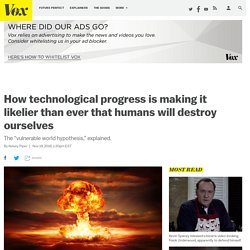
It has also made it easier than ever to cause destruction on a massive scale. What is AI? Your artificial intelligence questions, answered. Stephen Hawking has said, “The development of full artificial intelligence could spell the end of the human race.”
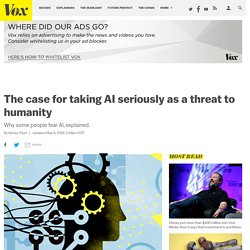
Elon Musk claims that AI is humanity’s “biggest existential threat.” That might have people asking: Wait, what? But these grand worries are rooted in research. Along with Hawking and Musk, prominent figures at Oxford and UC Berkeley and many of the researchers working in AI today believe that advanced AI systems, if deployed carelessly, could end all life on earth. AI: The Pros, Cons, and What To Really Fear. Dive into what's known so far about the new AI arms race — with a particular eye on U.S. and Chinese efforts — in a new special report.
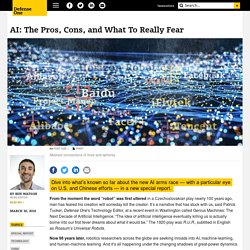
From the moment the word “robot” was first uttered in a Czechoslovakian play nearly 100 years ago, man has feared his creation will someday kill the creator. It’s a narrative that has stuck with us, said Patrick Tucker, Defense One’s Technology Editor, at a recent event in Washington called Genius Machines: The Next Decade of Artificial Intelligence: “The idea of artificial intelligence eventually killing us is actually borne into our first fever dreams about what it would be.” The 1920 play was R.U.R., subtitled in English as Rossum’s Universal Robots. Should We Fear the Rise of Intelligent Robots? As an artificial intelligence researcher, I often come across the idea that many people are afraid of what AI might bring.
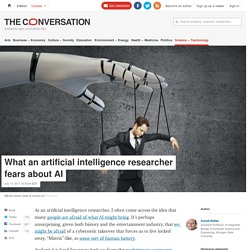
It’s perhaps unsurprising, given both history and the entertainment industry, that we might be afraid of a cybernetic takeover that forces us to live locked away, “Matrix”-like, as some sort of human battery. And yet it is hard for me to look up from the evolutionary computer models I use to develop AI, to think about how the innocent virtual creatures on my screen might become the monsters of the future. Might I become “the destroyer of worlds,” as Oppenheimer lamented after spearheading the construction of the first nuclear bomb? I would take the fame, I suppose, but perhaps the critics are right.
Maybe I shouldn’t avoid asking: As an AI expert, what do I fear about artificial intelligence? Fear of the unforeseen. Sayōnara, Humans: Japanese Company Replaces Its Workers with AI. 34 workers at a Japanese insurance company are being laid off and replaced with an artificial intelligence (AI) system.
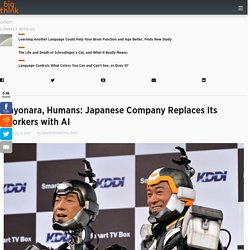
Fukoku Mutual Life Insurance, seeking greater efficiency in calculating their payouts to policyholders, will soon replace many of its office workers with an AI system based on IBM's Watson Explorer ("a cognitive technology that can think like a human"). In a recent press release, Fukoku Mutual Life Insurance stated an expected increase in productivity by 30% from their "Diagnostic document assessment automatic coding system.
" The AI system will be used to read and understand medical certificates, hospital stays, surgical procedures, and medical history to make a more accurate assessment of payouts. According to reporting from the Guardian, the company will see a return on investment in less than two years. 47% of Jobs Will Disappear in the next 25 Years, Says Oxford University. The Trump campaign ran on bringing jobs back to American shores, although mechanization has been the biggest reason for manufacturing jobs’ disappearance.

Similar losses have led to populist movements in several other countries. But instead of a pro-job growth future, economists across the board predict further losses as AI, robotics, and other technologies continue to be ushered in. What is up for debate is how quickly this is likely to occur. Now, an expert at the Wharton School of Business at the University of Pennsylvania is ringing the alarm bells. According to Art Bilger, venture capitalist and board member at the business school, all the developed nations on earth will see job loss rates of up to 47% within the next 25 years, according to a recent Oxford study. To be clear, mechanization has always cost us jobs. It may not feel like anything to be an alien. An alien message in Arrival movie (dredit: Paramount Pictures) By Susan Schneider Humans are probably not the greatest intelligences in the universe.

Theconversation. Star physicist Stephen Hawking has reiterated his concerns that the rise of powerful artificial intelligence (AI) systems could spell the end for humanity.
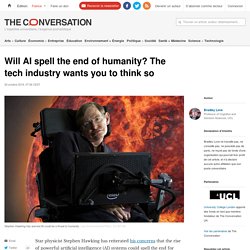
Human and Artificial Intelligence May Be Equally Impossible to Understand. Dmitry Malioutov can’t say much about what he built.
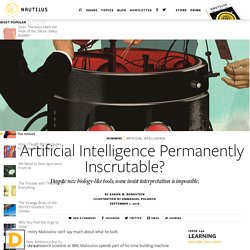
As a research scientist at IBM, Malioutov spends part of his time building machine learning systems that solve difficult problems faced by IBM’s corporate clients. One such program was meant for a large insurance corporation. It was a challenging assignment, requiring a sophisticated algorithm. When it came time to describe the results to his client, though, there was a wrinkle. “We couldn’t explain the model to them because they didn’t have the training in machine learning.” Earth - We might live in a computer program, but it may not matter. Theconversation. Cooperation is one of the hallmarks of being human.
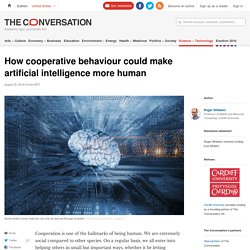
We are extremely social compared to other species. On a regular basis, we all enter into helping others in small but important ways, whether it be letting someone out in traffic or giving a tip for good service. We do this without any guarantee of payback. Donations are made at a small personal cost but with a bigger benefit to the recipient.
This form of cooperation, or donation to others, is called indirect reciprocity and helps human society to thrive. Digging into the Archeology of the Future. Thomas Rid, Rise of the Machines: A Cybernetic History (W.W. Norton, 2016). Alexander the Great had Bucephalus, from whose back he could survey his phalanxes. Frederick the Great typically sought out the vantage point of a tall hill. A forward commander in World War I had a sandbagged trench bunker, a periscope, and a hand-cranked telephone. And the Cold War had its iconic blue room. See What Happens When Killer Robots Are Born in a Car Factory. Could you imagine a robot takeover beginning anywhere other than a major automobile factory?
It only makes sense—car plants are already some of the most automated, robot-packed spots on the planet. Robot Takeover? Get Creative, Chomsky Says. Photo Credit: Jeremy Danger/Flickr Wondering how secure your current job is due to robots infiltrating the workforce? Noam Chomsky has some answers, but you probably won’t like them. According to Chomsky, it’s only a matter of time before robots can perform high level jobs. The MIT professor is totally cool with the robots being smarter, in many ways, than people, himself included. The Problem of AI Consciousness. WATCH: Elon Musk explains why we’re already cyborgs — and probably living in a videogame. Theconversation. Hail to the Computer. While at least some AI researchers concede that creating a presidential computer is within the realm of possibility, that is an entirely different question than whether we should elect an AI president.
Fear our new robot overlords: This is why you need to take artificial intelligence seriously. There are a lot of major problems today with tangible, real-world consequences. A short list might include terrorism, U.S. Could machines have become self-aware without our kn... Usually when people imagine a self-aware machine, they picture a device that emerges through deliberate effort and that then makes its presence known quickly, loudly, and (in most scenarios) disastrously. Even if its inventors have the presence of mind not to wire it into the nuclear missile launch system, the artificial intelligence will soon vault past our capacity to understand and control it. Can a robot be conscious? Does the ‘Chinese room’ argument preclude a robot uprising? In this blog series, Olle Häggström, author of Here Be Dragons, explores the risks and benefits of advances in biotechnology, nanotechnology, and machine intelligence.
Can a robot be conscious? March of the Machines: Is AI a Threat to Mankind? Meet the man who wants to be president, and then live forever. The Doomsday Invention. I. Constraints On Our Universe As A Numerical Simulation. IBM senses change with its annual “5-in-5” list for 2012. David Deutsch – On Artificial Intelligence. Robots aren’t getting smarter — we’re getting dumber.
Artificial intelligence: ‘Homo sapiens will be split into a handful of gods and the rest of us’ Philosophical Disquisitions: Polanyi's Paradox: Will humans maintain any advantage over machines? Why Human Intelligence and Artificial Intelligence Will Evolve Together, by Stephen Hsu. The founder of Evernote made a great point about why AI (probably) won't kill us all. Artificial intelligence will make religion obsolete within our lifetime. Is effective regulation of AI possible? Eight potential regulatory problems. Singularity: Artificial Intelligence Will Kill Our Grandchildren. Upload your mind and live forever — Hopes&Fears — flow "Science" A Framework for Understanding our Ethical Relationships with Intelligent Technology. The Epistemic Costs of Superintelligence: Bostrom's Treacherous Turn and Sceptical Theism. For a brighter robotics future, it’s time to offload their brains. Building Moral Robots, With Whose Morals?
The AI Revolution: Road to Superintelligence - Wait But Why. An Open Letter To Everyone Tricked Into Fearing Artificial Intelligence. Predicting what topics will trend on Twitter - MIT Media Relations. Predicting The Future: Fantasy Or A Good Algorithm? Can We Make the Hardware Necessary for Artificial Intelligence? Are the robots about to rise? Google's new director of engineering thinks so… How Artificial Superintelligence Will Give Birth To Itself. Files/AIPosNegFactor.pdf. Files/CFAI.pdf. Facing the Intelligence Explosion. Files/IE-EI.pdf. Files/IE-ME.pdf. Files/AIPosNegFactor.pdf. Files/CognitiveBiases.pdf.
Nick Bostrom on Superintelligence: Paths, Dangers and Strategies. Can AI save us from AI? Artificial intelligence: two common misconceptions. The wonderful & terrifying implications of AI.